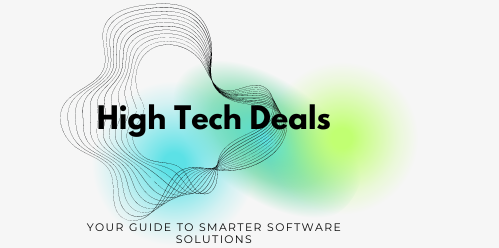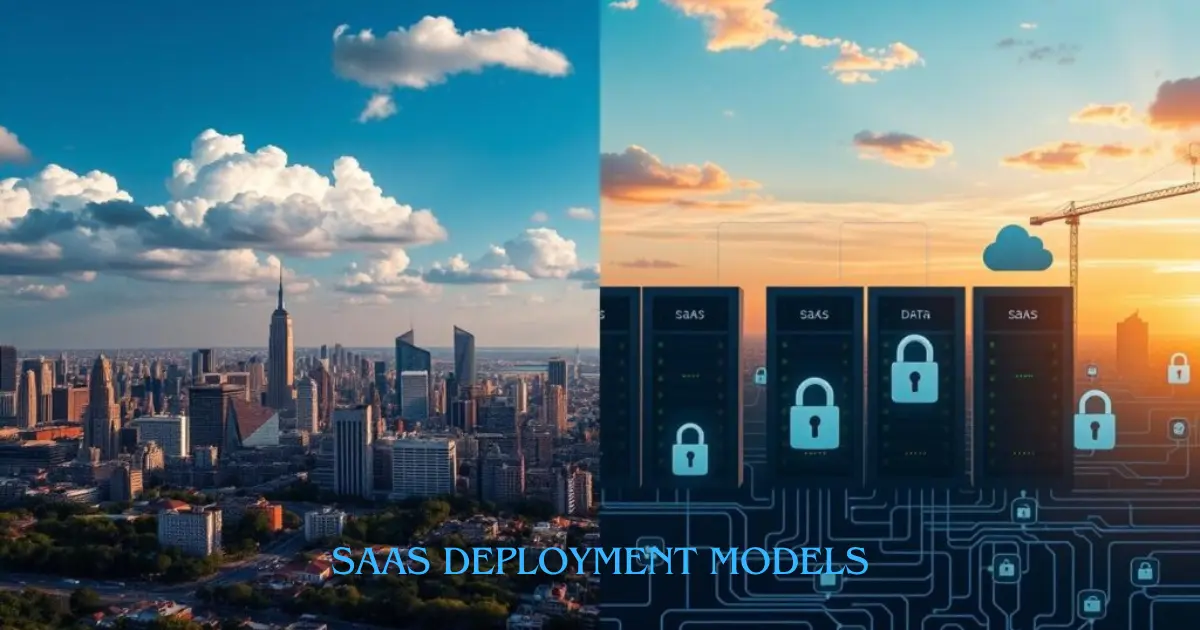Table of Contents
In the world of software as a service (SaaS), companies must choose between public and private models. This choice affects data security, scalability, and performance. This article will help you understand the differences between these models. It aims to guide businesses in making the right choice for their needs.

Key Takeaways
- Public SaaS is more scalable and cost-effective, while private SaaS offers better data security and customization.
- Decisions on public or private SaaS depend on industry rules, data sensitivity, and IT setup needs.
- SaaS models impact data safety, with public platforms using shared security and private ones offering more control.
- Scalability and performance differ between public and private SaaS. Public platforms are often more flexible and use public cloud infrastructure.
- It’s important to consider business needs, compliance, and IT capabilities when picking a SaaS model.
Understanding SaaS Deployment Models
The world is moving towards SaaS platforms for their ease and growth. It’s key to know how these cloud services work and why businesses pick public or private SaaS deployment models. This part covers the basics of SaaS architecture and what to think about when choosing a deployment for any business size.
The Fundamentals of Software as a Service
Software as a Service (SaaS) means software is hosted in one place and users access it online. This way, companies don’t have to install software on each device. They can use it through a web browser or app.
The SaaS architecture often uses a shared setup. This means one software instance serves many users. It’s efficient and cost-effective for delivering software.
Factors Influencing SaaS Deployment Choices
https://www.google.com/search?q=saas+development+model&sca_esv=2fcd8f477f0cf976&sxsrf=ADLYWIKTbCvLky9zVfQHjq9xWdVI-NgLwQ%3A1728740691856&ei=U30KZ9z3M76di-gPgvKguAQ&oq=saas+development+MO&gs_lp=Egxnd3Mtd2l6LXNlcnAiE3NhYXMgZGV2ZWxvcG1lbnQgTU8qAggAMgYQABgWGB4yBhAAGBYYHjIGEAAYFhgeMggQABiABBiiBDIIEAAYgAQYogQyCBAAGIAEGKIEMggQABiABBiiBEjIOlD0BViOLHABeAGQAQCYAaQCoAGFCKoBBTAuNC4yuAEDyAEA-AEBmAIHoALaCMICChAAGLADGNYEGEfCAg0QABiABBiwAxhDGIoFwgIKEAAYgAQYQxiKBcICCBAAGIAEGMsBwgIKEAAYgAQYFBiHAsICBRAAGIAEwgIIEAAYFhgeGA-YAwCIBgGQBgqSBwcxLjQuMS4xoAe6IA&sclient=gws-wiz-serpChoosing between public or private SaaS deployment depends on several things. These include:
- Security and data privacy needs
- The need for customization and control
- Scalability and performance needs
- Overall cost and operational considerations
Knowing these factors is important for picking the right SaaS deployment model for your business.

“The choice between public and private SaaS deployment is a strategic decision that should be made based on a thorough evaluation of an organization’s specific needs and objectives.”
Public SaaS Deployment Model
The public SaaS model is popular for its cost-effectiveness and scalability. It’s different from traditional on-premise software. Public SaaS platforms are hosted on shared, multi-tenant infrastructure. This allows providers to spread the cost among many customers.
Benefits of Public SaaS Deployment
The public SaaS model offers many benefits. Let’s look at some key advantages:
- Cost-Effectiveness: Businesses don’t need to spend on expensive hardware and software licenses. They can use a pay-as-you-go model with predictable fees.
- Scalability: Public SaaS solutions grow easily. Companies can adjust their usage and storage as needed. This flexibility helps with growth or seasonal changes without big investments.
- Accessibility: Users can access the software from anywhere with internet. This is great for remote or distributed teams. It helps employees work together and stay productive, no matter where they are.
- Automatic Updates: Providers handle software updates. This means users always get the latest features and security patches. It saves IT resources for other important tasks.
However, public SaaS might not be right for businesses with strict data security or regulatory needs. But for those looking for cost-effective, scalable, and accessible software, it’s a strong option.
| Feature | Public SaaS | Private SaaS |
|---|---|---|
| Cost | Lower upfront cost, pay-as-you-go subscription model | Higher initial investment for infrastructure and IT resources |
| Scalability | Highly scalable, can easily adjust usage and storage | Scaling can be more complex, requires additional infrastructure investments |
| Accessibility | Easily accessible from anywhere with an internet connection | Access may be limited to specific locations or devices |
| Maintenance | Handled by the SaaS provider, reducing the burden on internal IT teams | Requires dedicated IT resources for maintenance and updates |

“The public SaaS model has democratized access to powerful software solutions, making them more accessible to businesses of all sizes.”
Private SaaS Deployment Model
Businesses are looking for more control over their data and security. The private SaaS model is becoming a popular choice. It’s different from public SaaS, where a third-party hosts the software. With private SaaS, companies keep their data in their own systems, improving security and meeting compliance.
The private SaaS data security model gives companies a lot of control. They can customize the software to fit their needs. This is especially helpful for industries like healthcare and finance, where data security is critical.
Also, private SaaS lets companies own and manage their data. This is key for handling sensitive information or meeting strict regulations. By hosting the software in their own data centers, companies keep their data safe and under their control.
While private SaaS requires a big investment in infrastructure, the benefits are worth it. Companies get better data security, more flexibility, and customization. They also have control that public SaaS can’t offer.
The choice between public and private SaaS depends on each company’s needs. By looking at their data security, compliance, and IT setup, businesses can choose wisely. This ensures their SaaS projects meet their goals and succeed in the long run.
SaaS Deployment Models and Data Security
Data security is key for businesses using SaaS. The choice between public and private SaaS affects how data is kept safe. Let’s look at the data security needs for each model.
Data Protection in Public SaaS Platforms
Public SaaS platforms are convenient and scalable. But, they also bring data security challenges. Since data is on the provider’s servers, businesses must trust their security.
SaaS data security in public platforms is vital. Providers must use strong security, encryption, and access controls to protect data.
Data Security in Private SaaS Environments
Private SaaS environments give businesses more control over their data. They host the SaaS on their own servers. This way, companies can customize data protection in public SaaS to fit their needs.
This approach is great for companies with strict data policies or those in regulated industries. It offers tighter control over access and encryption.
Choosing between public and private SaaS depends on a business’s data security needs. It also depends on industry regulations and the need for control over sensitive information.
SaaS deployment models: Scalability and Performance
Choosing between public and private SaaS deployment models is key. It affects how well your SaaS platform scales and performs. Knowing the differences helps businesses get the most out of their SaaS apps.
The public SaaS deployment model is great for scaling. It can grow or shrink based on how many users you have. This means you can handle sudden increases in traffic easily. But, because many users share the same resources, performance might not always be perfect.
The private SaaS deployment model gives you more control. You get dedicated resources, leading to better and more consistent performance. This is especially good for apps that are very important to your business. But, you’ll need to manage and scale the infrastructure yourself, which can be challenging.
Deciding between public and private SaaS depends on what you need. You have to think about scalability, performance, and how much control you want. Businesses should look at their specific needs and IT setup to choose the best model. This ensures they get the best SaaS scalability and SaaS performance.
Choosing the Right SaaS Deployment Model
Choosing between public or private SaaS deployment is key. It’s important to pick the right one for your business. You need to look at your business needs carefully.
Evaluating Business Needs and Requirements
First, think about what your business needs. Look at data sensitivity, regulatory rules, how much you need to grow, and customization needs. Public SaaS is often cheaper and more flexible. But, private SaaS gives better security and control.
Consider how sensitive your data is and the rules you must follow. If your data is very private or regulated, private SaaS is safer. But, if you need flexibility, public SaaS might be better.
FAQ
What are the key differences between public and private SaaS deployment models?
Public SaaS is cost-effective and easy to access. It’s great for businesses that don’t need strict security. On the other hand, private SaaS gives more control over data and security. It’s best for companies with strict compliance needs.
What are the benefits of the public SaaS deployment model?
Public SaaS is affordable and scalable. It’s perfect for businesses that don’t need strict security. It’s also easy to set up and maintain.
What are the advantages of the private SaaS deployment model?
Private SaaS offers more control over data and security. It’s ideal for companies with strict security needs. It also allows for more customization, but it costs more upfront.
How do public and private SaaS deployment models differ in terms of data security?
Data security is key when choosing a SaaS model. Public SaaS has strong security, but shared infrastructure might be a concern. Private SaaS gives more control over data security but costs more.
How does the choice of SaaS deployment model impact scalability and performance?
The SaaS model you choose affects scalability and performance. Public SaaS is more scalable and flexible. Private SaaS offers customized performance and control, depending on your needs.
How can businesses evaluate their needs to determine the right SaaS deployment model?
Businesses should evaluate their needs carefully. Consider security, compliance, customization, and cost. This helps decide if public or private SaaS is best for your business.

